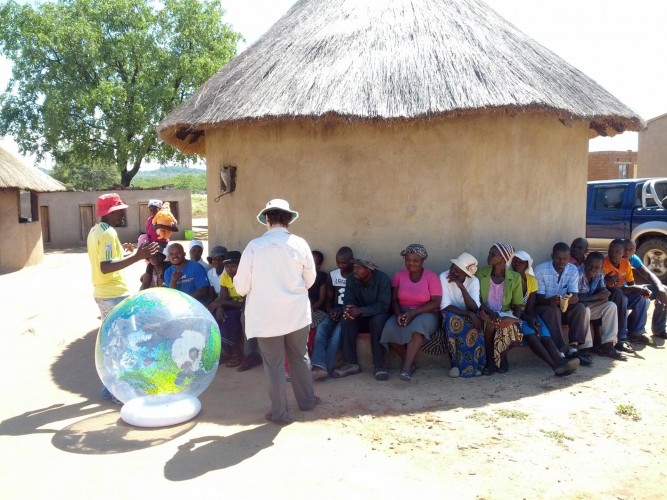UC Davis Global Affairs Grant Helps Advance Sustainable Development Goals via the work of The Muonde Trust in Zimbabwe
On March 9th, Postdoc M.V. Eitzel and Center Director Ryan Meyer (along with Pamela Reynolds from UC Davis DataLab and Sarah Mccullough from UC Davis’ Feminist Research Institute) were honored at a reception hosted by UC Davis’ Global Affairs program. Global Affairs has awarded them a grant to build on M.V.’s past work with The Muonde Trust.
Muonde is a registered non-governmental organization in Mazvihwa Communal Area, Zimbabwe that works to support and spread Indigenous innovation and conducts community-based research projects to track community and ecological wellbeing over time (often in partnership with international allies). Examples of Muonde’s projects include water harvesting to improve crop resilience, cultivation of Indigenous varieties of drought-resistant small grains (largely millet and sorghum), supporting women and children in educational attainment, mapping water sources and important cultural, spiritual, and historical locations, and community-based modeling (used to help shift local land-use policy to avoid deforestation).
 As a community-based research team
supporting Indigenous innovation, Muonde is engaged with work
that aligns with the Center’s goals to broaden and improve
participation in science by diverse communities. Together, the UC
Davis and Muonde teams will evaluate the UN Sustainable Development Goals
from several angles: 1) how Muonde’s Indigenous innovation
projects contribute to meeting the SDGs, 2) how Muonde’s
community-based research tracks and assesses their own projects,
and 3) how effective the SDGs are for Muonde’s needs in tracking
and assessing community and ecological wellbeing.
As a community-based research team
supporting Indigenous innovation, Muonde is engaged with work
that aligns with the Center’s goals to broaden and improve
participation in science by diverse communities. Together, the UC
Davis and Muonde teams will evaluate the UN Sustainable Development Goals
from several angles: 1) how Muonde’s Indigenous innovation
projects contribute to meeting the SDGs, 2) how Muonde’s
community-based research tracks and assesses their own projects,
and 3) how effective the SDGs are for Muonde’s needs in tracking
and assessing community and ecological wellbeing.
Many of Muonde’s projects relate to SDGs, for example: “(2) no hunger,” via their agricultural innovations, “(4) quality education,” from adult education assistance, “(15) land resources” via land use modeling to avoid deforestation, “(16) peace, justice, and strong institutions,” through the team’s mapping of sacred sites – and many more. Muonde tracks the success of these innovations in some cases, and we will investigate when and where they are able to demonstrate progress towards the SDGs via their community-based research. And finally, some SDGs are not applicable to rural areas, and there may be important dimensions of wellbeing in Muonde’s part of Zimbabwe that are not addressed in the SDGs – therefore, what other assessments might be needed to gain an actionable picture of community and ecological wellbeing?
The project will contribute to the field of Community and Citizen Science by demonstrating how CCS can contribute to assessing SDGs, will support Muonde in examining how well they track the outcomes of their own projects, and will advance the pursuit of diversity/equity/inclusion in community-engaged projects in the Global South by investigating how the SDGs serve (or don’t serve) the community in Mazvihwa Communal Area.
We look forward to virtual collaboration with Muonde later this summer, culminating in virtual seminars in Fall at our campus Centers and the development of materials for an academic journal article and for workshops, seminars, and courses run by the Center for Community and Citizen Science, the DataLab, and the Feminist Research Institute.








